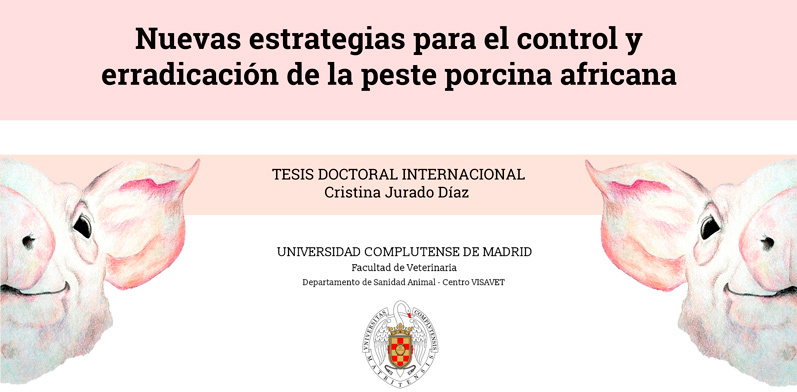Cristina Jurado Díaz PhD Thesis

Next tuesday 5th of November, Cristina Jurado Díaz will defend her PhD Thesis "New strategies for the control and eradication of African swine fever" directed by Prof. José Manuel Sánchez-Vizcaíno, Dr. Lina Mur and Prof. Beatriz Martínez López.
The event will take place at 12:00 in the auditorium of the VISAVET Center of the UCM (how to get there).
Abstract:
African swine fever, ASF, is one of the notifiable infectious diseases of swine that causes greater sanitary and economic impact. Currently, its relevance is increasing due to disease presence in Africa, Asia and Europe. This doctoral thesis is entitled new strategies to control and eradicate African swine fever, and aims at developing new tools and epidemiological knowledge to prevent, control and eradicate ASF globally. Thus, the most relevant characteristics of the disease and its related risks were explored within the framework of three different scenarios, endemic scenario focused on Sardinia, epidemic scenario regarding the European Union, EU, pig industry and free scenario represented by the United States, US. Results from this doctoral thesis have been published in international peer reviewed journals as five scientific articles. In addition, four specific objectives were achieved. First, to identify the main gaps of knowledge with regard to ASF and evaluated by experts as high, medium or low priorities. The obtained results identified thirty six gaps, nineteen of them were classified as high priorities, eleven as medium and six as low. These priorities were related to virus characteristics, natural hosts, clinical forms, epidemiology, socio-economic impact, immune response, prevention, detection and control, and diagnosis and vaccine. Second, to identify risk factors favouring ASF endemicity in Sardinia. Thus, 28 variables were assessed. A total of nine risk factors were identified which were related to lack of professionalism of the pig sector, cultural practices such as “brado” animals and wild boar presence. Moreover, specific strategies were suggested in order to mitigate the identified risk factors. Third, to identify available preventive measures to avoid the spread of ASF on domestic pig farms commercial, non-commercial and outdoor farms from the EU. To do so, a systematic review was conducted by analysing the published scientific and non-scientific literature. The identified measures were also assess by an ASF expert panel. Among others, the identification of animals and farm records, enforcement of the ban on swill feeding and containment of pigs to not allow contact with pigs from other farms, feral pigs or wild boar or their products were identified as relevant measures on any type of pig farms. In addition, all experts agreed that the most important preventive measure on non-commercial and outdoor farm was to improve access to veterinary services. Fourth, to assess the risk of entry of ASFV into the US by prohibited pork products carried in air passengers’ luggage. The obtained results showed that China, Hong Kong, the Russian Federation and Poland were the origin regions that represented the highest risk. Therefore, this doctoral thesis have tried to give solutions to the current situation. Indeed, results presented have been already used by Sardinian authorities and several American swine associations have shown their interest in these results. Moreover, it is expected that results and conclusions of this doctoral thesis could help to initiate other studies in new scenarios such as the Asian one in order to control and eradicate ASF.


